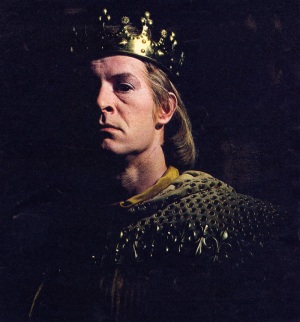These two productions, which complete the cycle of history plays directed by Terry Hands for the Royal Shakespeare Company, give the saga a grand and glorious opening and bring it to a spectacular conclusion.
Richard II is, by Hands's standards, a relatively simple production. It begins in mediaeval splendour, and ends in darkness. Farrah, whose design for Richard III consists of a ramp suspended on chains and black leather costumes in his favourite bike-boy style, has created here an extravagantly gorgeous court. The colours are gold and green and the style more or less authentically historical.
As this magnificent tableau comes to life, the play focuses on the two principals. David Suchet, as Bolingbroke, is immensely impressive. He moves ruthlessly towards his goal and proves a melancholy, wise, majestic king. Alan Howard's Richard is equally powerful, if more volatile.
